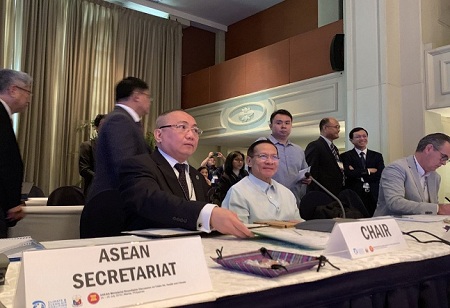The Philippine government hosted Southeast Asian Regional Center for Graduate Study and Research in Agriculture, expressed support for the inclusion of One Health concepts in basic education curriculum across Association of Southeast Asian Nations member countries. Searca director Dr. Glenn Gregorio said the center has joined One Health experts and officials of the specialist institutions of the Southeast Asian Ministers of Education Organization (Seameo) in a workshop on integrating One Health concepts in Southeast Asian (SEA) countries. Together with Gregorio representing the center at the said workshop held in Bangkok, Thailand on June 22 and 23, 2023 was Searca executive coordinator Beatrisa Martinez.
Participation in the workshop is in line with the One Health/EcoHealth approach, which is one of the seven priority areas identified in the center's current strategic agenda. He explained that while the One Health/EcoHealth approach aligns primarily with the sustainable development goal or SDG 3 which is Good Health and Well-being, it also aligns with other related goals, including those that fall within Searca's SDG commitment or SDG 2 which is Zero Hunger and SDG 13 which is Climate Action. Gregorio noted that by promoting sustainable and resilient agricultural practices, the One Health/EcoHealth approach contributes to SDG 2 by ensuring food security, improving nutrition and promoting sustainable agriculture. He said the approach resonates with SDG 13 as it recognizes the impact of climate change on health and advocates for sustainable practices to mitigate climate change and protect public health. The workshop was co-organized by the Seameo Tropical Medicine Network, the Southeast Asia One Health University Network, and multinational energy company Chevron.
During the workshop, Searca said the diverse group of participants assessed the extent of the current incorporation of One Health related concepts into basic educational curriculums in the region. With an active discussion that ensued on potential entry points within the curriculums to weave these crucial concepts into existing lesson plans, the workshop also sought to identify and prioritize key One Health related concepts that could be feasibly integrated into the curriculums. According to Gregorio, those deliberated during the workshop include various learning methodologies used and their potential application for concept integration while examining the training requirements of teachers to effectively integrate One Health principles into their classrooms. The participants explored potential facilitating factors for such integration, including the existence of supportive policies related to One Health and other interconnected health issues, and brainstormed on potential barriers to integration and proposed innovative strategies to surmount these challenges.

